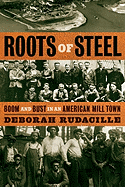
 At its peak in 1959, Bethlehem Steel's Sparrows Point mill, near Baltimore, employed more than 36,000 people and was the world's largest steel plant. Today, a mere 3,000 work there for the Russian steel company Severstal. Deborah Rudacille's history-cum-memoir tells a colorful but ultimately discouraging story that stands as proxy for the inexorable decline of the U.S.'s industrial dominance.
At its peak in 1959, Bethlehem Steel's Sparrows Point mill, near Baltimore, employed more than 36,000 people and was the world's largest steel plant. Today, a mere 3,000 work there for the Russian steel company Severstal. Deborah Rudacille's history-cum-memoir tells a colorful but ultimately discouraging story that stands as proxy for the inexorable decline of the U.S.'s industrial dominance.
Born in the blue-collar town of Dundalk, Md., a planned community created by Bethlehem for its workers after it took over Sparrows Point in 1916, Rudacille had many family members, including her father, who worked at the mill. She draws on those relationships and extensive interviews with other longtime employees to provide an intensely personal and candid cast to her narrative.
In uninflected prose as straightforward as the manufacturing processes she describes in capable detail, Rudacille, a science writer, offers a workmanlike account of Sparrows Point's storied life. The touchstones of her tale are the plant's long and often violent history of labor strife (the United Steelworkers first organized the plant in 1941), the racial tensions that plagued the workforce and the myopic decisions of Bethlehem management (its mishandling of the legacy costs of retired employees and a reluctance to invest in new technology are two of the most glaring) that contributed to a generation-long death spiral.
Rudacille brings a decidedly pro-union perspective to her story, praising the USW for its efforts to address some of Sparrows Point's worst environmental and safety depredations. Despite that, her decision not to whitewash the union's role in preserving a seniority system that served to perpetuate racial inequality lends credibility to her account.
Yet the tale of Sparrows Point is much more than a depressing saga of dangerous, backbreaking labor and racial strife. The shipyards adjacent to the mill played a critical role in arming the U.S. in World War II, grinding out warships at the astonishing rate of one every two weeks at the height of their productivity. And beginning with the postwar generation, the wages brought home by the millworkers were responsible for moving thousands of families decisively into the middle class, enabling their children and grandchildren to attend college and obtain jobs in the service industries that have supplanted manufacturing as the country's employment base.
On the heels of Bethlehem's bankruptcy in 2001, Sparrows Point changed hands four times between 2003 and 2008, as corporate vultures picked over the company's carcass. Roots of Steel delivers an unsentimental epitaph for a vanished era in the country's economic history. --Harvey Freedenberg
Shelf Talker: An insightful account of the flourishing and slow decline of an iconic institution in the history of American industry.

